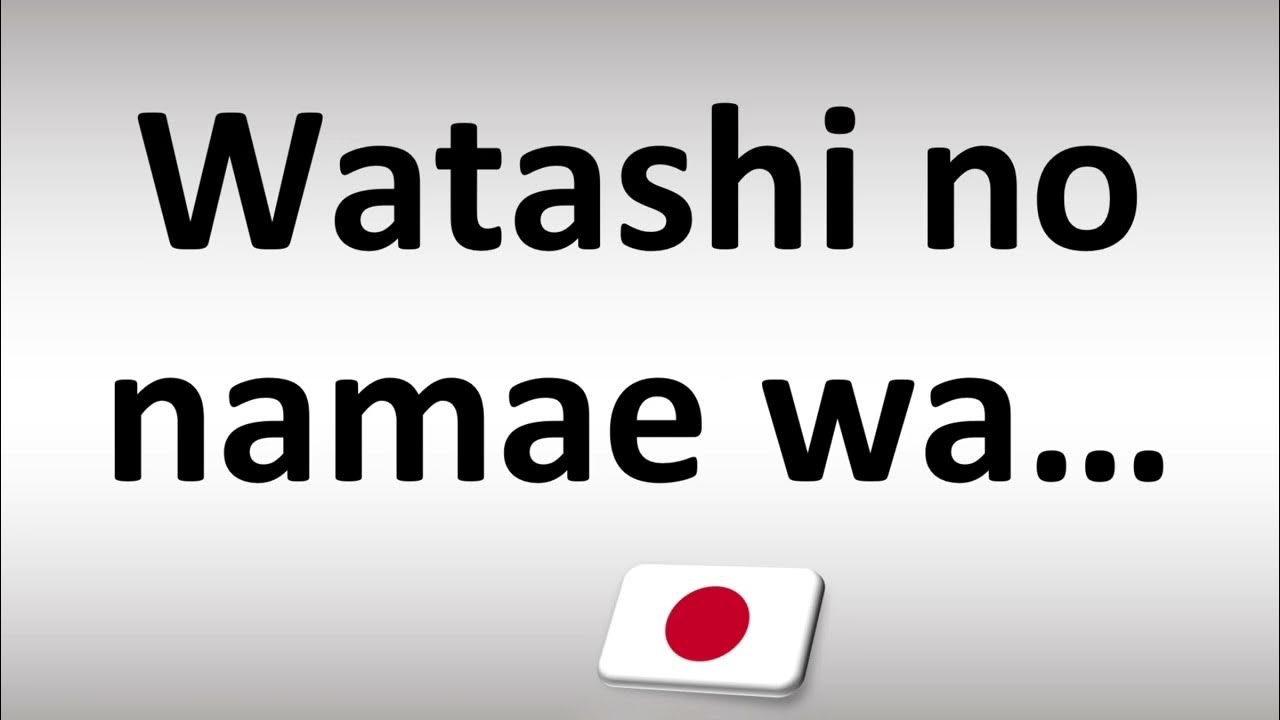
Meaning of Watashi wa – Your Beginner’s Guide to this Common Japanese Phrase
Published: 2025-05-05 10:00:17
Have you ever started learning Japanese and stumbled upon the phrase "Watashi wa"? You’re not alone. If you’re a beginner, this simple yet common phrase might have left you confused. For many new learners, “Watashi wa” seems straightforward, but it can be a bit tricky to understand in the broader context of Japanese grammar. So, why does “Watashi wa” get so much attention? It’s because it’s the foundation of sentence structure in Japanese. Understanding how to use it is one of the most important steps in your Japanese learning journey.
But here's the thing: even though "Watashi wa" is one of the first phrases you'll encounter, it’s often misunderstood by learners, even advanced ones! It's much more than just "I" or "me" — it reflects the unique way Japanese speakers view and use language. In this guide, we’ll break down everything you need to know about "Watashi wa" and how to master it like a pro.
What Does “Watashi wa” Mean?
Before diving deeper, let’s break it down.
- “Watashi” — This is the Japanese word for "I" or "me." In formal contexts, it is gender-neutral. However, in informal settings, it’s more commonly used by women, while men may prefer other pronouns like "Boku" or "Ore."
- “Wa” — This is a topic marker, not a subject marker. It’s used to indicate the topic of the sentence, which is a crucial distinction in Japanese sentence structure. Think of it as a way to say, “As for me...” rather than just “I.”
When combined, “Watashi wa” translates roughly to "As for me..." or "I am..." depending on the context. For example, if you say, “Watashi wa gakusei desu,” it means “I am a student,” but with a slight emphasis on “I” or “as for me” being the subject of the sentence.
Master the sounds of the language with this Japanese pronunciation guide.

When and How Is “Watashi wa” Used?
Now that we know what “Watashi wa” means, let’s discuss when and how it’s used in conversation.
- In Self-Introductions – The most common time you’ll use “Watashi wa” is when introducing yourself. You’ll often hear, “Watashi wa [name] desu,” which means “I am [name].” For example, "Watashi wa Ankit desu" translates to “I am Ankit.”
- To Start a Sentence About Yourself – Another common use of “Watashi wa” is when you want to talk about something related to yourself, like your preferences or plans. You might say, “Watashi wa eiga ga suki desu,” which means “I like movies.”
- Gender-Neutral, But Cultural Context Matters – “Watashi” is often used by women in informal speech, though it is considered gender-neutral in formal contexts. This cultural nuance is important to understand, especially as you get deeper into learning Japanese.
For students aiming to study in Japan, understanding the complete process of applying for the MEXT scholarship undergraduate program is crucial—learn more in our detailed guide MEXT Scholarship Undergraduate Guide.

Common Mistakes and Misunderstandings
As simple as “Watashi wa” seems, beginners often make a few key mistakes:
- Thinking “Watashi wa” is a Full Sentence – While "Watashi wa" can start a sentence, it doesn't always complete one. It’s just the subject or topic of the sentence. You’ll need to add a verb or additional information to make it a full sentence. For example, “Watashi wa gakusei desu” is complete, but just saying “Watashi wa” on its own would leave the sentence unfinished.
Learn the right expressions with our guide on how to say thank you in Japanese.
- Overusing “Watashi wa” in Casual Speech – In more casual settings, Japanese speakers often drop “Watashi wa” when the context is clear. Overusing it can sound overly formal or stiff. For example, in casual conversation, you might hear someone simply say “Gakusei desu” (I’m a student) without the “Watashi wa.”
- Confusing the “Wa” Particle with the “Ha” Hiragana Character – Many learners confuse the “wa” particle with the “ha” hiragana character. While they are written the same, they have different functions. The “ha” character is used in words like "hajimemashite" (nice to meet you), but when used as a particle, it is pronounced “wa.”
Variations Based on Formality and Gender
In addition to “Watashi wa,” there are other ways to refer to yourself, depending on your gender and the formality of the situation.
- “Boku wa” – More commonly used by men, “Boku” is a slightly less formal way of saying “I.” It’s still polite, but it’s often seen as more relaxed than “Watashi.”
- “Ore wa” – This is even more informal and used primarily by men in casual or intimate settings. It’s less polite than “Boku wa” or “Watashi wa” and is typically used among close friends or peers.
- Dropping “Watashi wa” – As mentioned, in casual conversation, “Watashi wa” can be omitted if the context is clear. For example, if you're talking to a friend about your favorite activities, you might simply say “Eiga ga suki desu” (I like movies), without needing to say “Watashi wa.”
Explore top Japanese language institutes with job placement to boost your career prospects.
Cultural Insights: Why “Watashi wa” Isn’t Always Necessary
Here’s an interesting point: In Japanese, the subject of a sentence is often implied and doesn’t need to be stated. Japanese speakers omit subjects frequently, relying on context to make things clear. So, even if you’re talking about yourself, you don’t always need to say “Watashi wa.”
For example, in a conversation with a friend, if you say, “Kare wa suki desu” (I like him), the subject “I” is implied, and no one will be confused. The minimalist nature of Japanese speech emphasizes the importance of context over repeating subject pronouns.
This cultural difference is a key part of becoming fluent in Japanese — it’s not about saying everything explicitly; it’s about understanding when to leave things unsaid.
Sample Sentences Using “Watashi wa”
Let’s look at some example sentences that use “Watashi wa” to help you get a clearer idea of how it works in real-world situations:
- Watashi wa gakusei desu. – “I am a student.”
- Watashi wa eiga ga suki desu. – “I like movies.”
- Watashi wa Tokyo ni ikimasu. – “I will go to Tokyo.”
These examples show how “Watashi wa” can be used to talk about different aspects of yourself. Whether it’s your occupation, your interests, or your plans, “Watashi wa” is the starting point for expressing these thoughts in Japanese.
Discover polite and casual ways to ask how are you in Japanese.

FAQs
- Does Watashi wa mean I love you?
No, “Watashi wa” only means “I” or “As for me.” To say “I love you,” you would use “Aishiteru” or “Suki desu,” depending on the context.
- Is Watashi wa for girls?
Not necessarily. “Watashi” is a formal, gender-neutral way to say “I,” but it’s more commonly used by women in casual speech. Men often use “Boku” or “Ore.”
- Do Japanese use Watashi wa?
Yes, but not always. In everyday conversation, Japanese speakers often omit “Watashi wa” when it’s obvious from context. It’s mainly used for clarity or emphasis.
- What is the meaning of Watashi wa mo?
“Watashi wa mo” means “Me too” or “I also…” where “mo” replaces “wa” to indicate inclusion.
Conclusion
Mastering “Watashi wa” is like learning to walk before you run in Japanese. It provides you with a solid foundation to build your Japanese skills. As you continue your language journey, remember that context, tone, and cultural nuances play a big role in how you use “Watashi wa.”
With practice and patience, you’ll soon know when to say it — and when you don’t need to. Happy learning!
